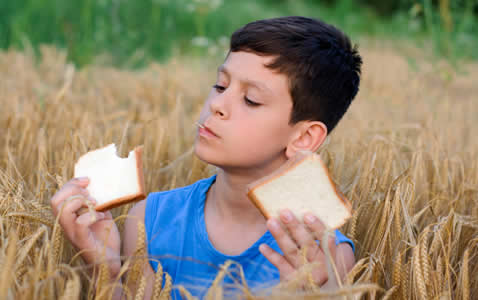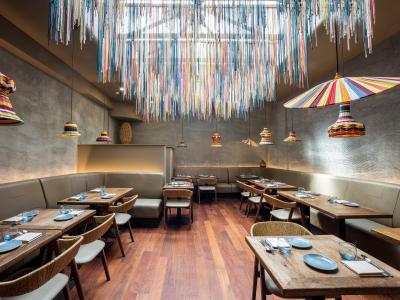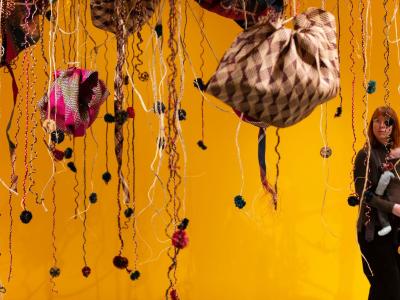Two years into my Spanish degree and I think I´ve got the language sussed. Then I arrive in Madrid and spend the first week of my internship with my head spinning as the language, explained so clearly in my textbooks, is ripped apart. Here are a few lessons I've learnt away from my textbooks, with a glossary just in case...
Lesson 1: The Family (and gender)
One of the first things you learn when approaching the Spanish language. Simple right?...yeh, until you arrive at the office and all of your colleagues seem to be related. How can all these men be each others tíos (uncles) you ask yourself? And is it really possible that this woman is their tía? The answer I realise, thankfully before fleeing from this of hotbed of incest, is no. However much the family is valued in Spain, take note that tío is simply the equivalent of ´mate.´ Likewise ladies, when someone exclaims ¡hombre! in your direction, you have not been mistaken for, nor (as much as gender roles may have changed in Spain in the last century) considered to be the other sex. Oh, and when the office itself is described, perhaps, even more disturbingly, as chica or even chiquitita (girl, little girl) your colleagues have not come so close to their place of work as to consider it human, nor a famous Abba song...
Glossary: chica - little. tío/tía - mate
Lesson 2. Go fry asparragus...
Then you are introduced to your boss- always a nerve-wracking prospect. Yet when he is described as the one who corta el bacalao, you are left even more on edge than before. If this is a clothing business, why is the boss wasting his time cutting cod? Food, another basic element of the Spanish language that you learnt from day one, becomes perhaps one of the most deceitful parts of Spanish when you stray from the textbooks. If you want to hacer buenas migas (make good crumbs with) your boss and workmates, it may feel like estás pidiendo peras al olmo (you are asking pears from an apple tree) but as long as tienes huevos (you have eggs) and take on a simple wariness around this gastronomic vocabulary it won´t be long before you are considered la leche, (the milk) or ´la pera´ (the pear.) If this does not go to plan however, and you are told by one of your less welcoming colleagues who tiene mala leche, (has bad milk) to véte a freír espárragos (go fry asparragos) you would be well advised to leave the office and not to return with a culinary vegetarian treat…
Glossary: Corta el bacalao – ruling the roost. Hacer buenas migas – hit it off with. Estás pidiendo peras al olmo - you are asking for the impossible. La leche - amazing. La pera - the best. Tener mala leche - have bad vibes/be nasty. Véte a freír espárragos - clear off
Lesson 3: Don't sweat your shirt
So...new country, new culture, new weather… undoubtedly you will need new outfits to adapt. Yet, after you spend hours choosing what to wear, as you enter your new job and realize that neither knowing what to wear, nor how to describe it will stop you from metiéndose en camisa de once varas (getting into a shirt with eleven sticks). Having lent your friend money, you feel rather insulted to be told simply in reply that estás como un guante ( you’re like a glove) even though she looks grateful. Indeed, constantly confused, you may feel that no te llegas ni a la suela del zapato (you don’t reach even to the sole of the shoe) as the voice in your head tells you zapatero, a sus zapatos (shoesmith, to his shoes) – English. But don´t bajarse los pantalones (lower your trousers) or´ colgar los guantes´ (hang up your gloves.) Just aslong as you know Spanish clothing can be transformed dramatically into a new meaning, you will be sure to get along con la gorra (easily) without having to sudar la camiseta,´(sweat your shirt.)
GLOSSARY: metiéndose en camisa de once varas- getting in a mess. Estás como un guante´ - you´re a sweetie. No te llegas ni a la suela del zapato - you´re useless. Zapatero, a sus zapatos - stick to what you know. Bajarse los pantalones - give in con la gorra - easily sudar la camiseta - run yourself into the ground.
Lesson 4: Be on the white
Even if you struggle to describe the items of clothes you are wearing you can surely describe your outfit with simple colour adjectives. You learnt them in secondary school right? Yet, as your mente queda en blanco,´(mind stays white) when you are told that a plan from work está verde, (is green),’ you may feel that you yourself está verde en español don´t know a thing about Spanish) an idea that could easily ´ponerte negro,´( make you black) Indeed, far from simple, it seems colours form an array of colourful phrases that seem to epitomise your predicament when faced with confusing colloquial Spanish. Take my advice and comerse un marrón (eat a sweet chestnut) and in no time you will dar en el blanco (give on the white) with such idioms.
GLOSSARY: mente queda en blanco - mind goes blank. Está verde,´( in its early stages,’ ponerte negro,´( make you angry.) comerse un marrón´( grin and bear it) ´dar en el blanco´(be spot on)
Lesson 5: Spend Pasta
The economy in Spain is notoriously not in its best state at the moment. Consequently, you are rather content to have found yourself a job, and a possible method of surviving the recession. However this feeling rapidly fades when your boss describes how much pasta or pelas (alternative words for money) you will receive. Although we are used to having to adapt to the alternative currency of the euro, you never expected to be paid in what you interpret to be ´pasta´ or hair. ´This said, with money such a taboo subject in Spain at the moment, perhaps these code words are not such a bad idea…
Lesson 6: Don't get like a goat
Reassured that you will be paid, you are then left baffled when one of your colleagues complains of always having to pagar el pato, (pay the duck) Before approaching the nearest river in search of the duck to whom you understand you have to pay your bills, judged immediately by onlookers to estar como una cabra, (be like a goat) be aware that once in Spain, your understanding of animal vocabulary will assuredly be dismantled. Indeed, in order to ´ser un loro´( be a parrot) in Spanish, you would be well advised to coger el toro por los cuernos, ( take the bull by its horns) and learn the range of animal idioms and phrases that have crept into the Spanish language, before you find yourself ´echando sapos y culebras´ (throwing frogs and snakes) as you understand so little.
GLOSSARY: pagar el pato, ( pay for other people´s mistakes.) estar como una cabra, ( be crazy,) ´ser un loro´( be a chatterbox, not a parrot) echando sapos y culebras´ (ranting and raving)
Lesson 6: When its raining jugs
Even if you are faced with problems inside the air-conditioned office, nobody can deny that one of the main reasons we English visit Spain is to flee England where it always ´llueve a cantaros´(raining jugs) ´de sol a sol´ (from sun to sun) Yet having escaped the rain you are then faced with a new problem- the array of confusing Spanish weather phrases which clearly have nothing to do with the weather. Indeed, when your boss, complaining of your lack of productivity states that ´estás en las nubes´ (your head´s in the clouds) you find your head spinning as you feel far from the overcast English skies. Is understanding these phrases ´pidiendo la luna´ (asking the moon) No, ´haz frente a la tempestad´ (weather the storm) and it won´t be long before ´todo va viento en popa´ (everything goes perfectly,) as your boss(puts you in the clouds)
GLOSSARY: llueve a cantaros´(rains cats and dogs) ´de sol a sol´ (from morning to night, not literally from sun to sun- as we all know far too well.) pidiendo la luna´ (asking for the impossible?) todo va viento en popa´(everything goes perfectly,) te pone por las nubes´(sings your praises.)
Lesson 7: Throw a hand, an eye...(maybe another body part?)
As you have probably learned, you would be well advised to ´ir con ojo´ (go with eye) or ´andarse con pies de plomo´ (go with lead feet) when facing familiar Spanish vocabulary in Spain. Indeed ´no metas la pata´( don´t put your foot in it) when familiar anatomical words, which also rapidly metamorphose in a colloquial setting. You will, inevitably, never understand all these phrases ´al pie de la letra,´(to the foot of the letter) but just ´echar un ojo,´( throw and eye) at a few so as to be aware when your workmate, falling asleep at her desk, describes how last night she could not ´pegar ojo,´ (hit the eye) she was not struggling with a do-it- yourself take on plastic surgery. Moreover, if your boss asks you to ´echar una mano,´ (throw away a hand) he is not unreasonably asking you to join in this game of self- amputation, and you would be well advised to ´levantar un dedo´ (lift a finger) to help him, unless you want him to think ´no tienes dos dedos de frente´(you don’t have two forefingers) or worse, you should be fired. ¡Ojo! (Eye!)
GLOSSARY: ´ir con ojo´or ´andarse con pies de plomo´ (be careful) ´al pie de la letra,´(exactly,) ´echar un ojo,´( take a glance) ´pegar ojo,´ (fall asleep) ´echar una mano,´ (lend a hand) no tienes dos dedos de frente´( you are stupid) ¡Ojo! ( Watch out!)
Lesson 8: Holy ghost!
In such a traditionally Catholic country, you would be well advised to ´no decir ni pío´ than to get confused with the array of religious terminology, unless you want to run the risk of ´armando la de Dios es Cristo,´(making out that god is Christ) But, don´t think that learning these phrases will be ´llegar y besar el santo,´ (to arrive and kiss the saint) Indeed, learning them will ´costar dios y su ayuda,´(cost god and his work) and at first, you may not understand ´ni dios,´( not a soul.) For example, when colleague tells you that she ´estaba en capilla´ (in the chapel) at the end of a film (well where were you girl in the chapel or the cinema, decide!). More importantly, if your boss tells you that ´me has hecho la pascua´ (you’ve made me Easter) then ´no eres su devoción´( you are not his devotion) As for the use of the word ´hostias´ (holy ghost) it would perhaps be best to use this word ´de Pascuas a Ramos,´ (from Easter to ,) that is, never at all.
GLOSSARY: armando la de Dios es Cristo,´(causing an almighty row.) ´llegar y besar el santo,´ ( easy/handed to you on a plate.) ´costar dios y su ayuda,´(take a lot of work, ´estaba en capilla´ left on tenterhooks me has hecho la pascua´ (you have messed up his plans) ´no eres su devoción´ (you are not his favorite person.) ´de Pascuas a Ramos,´ (once in a blue moon,)
Lesson 9: The final goodgye
The day is over and you can go home. Relief. All you have to do is say goodbye and then you can sink back to your textbooks and the Spanish you thought you knew. Yet even goodbye remains a tall order. Your Spanish friends call out Are we in Spain or Italy? Or ´¡hasta ahora!´ Doesn´t ahora mean ´now´? One friend even declares ´¡nos vemos!´ (Literally- we see or we will see each other.) However, having seen how confusing Spanish can be, I think it´s safe to conclude that perhaps the choice between the two most conventional ways of ´despidiéndote´(saying goodbye) may be the most difficult. Do you say ´¡adios!´(goodbye) or ´¡hasta luego! ´ (see you later?) In other words, will you return to this world of misunderstanding and see it again ´luego´(later?) This is a question, I am afraid
Learn Spanish this autumn with the best teachers from Spain at The Cervantes Institute, Spain's only official language school in London. Click here for more info
















